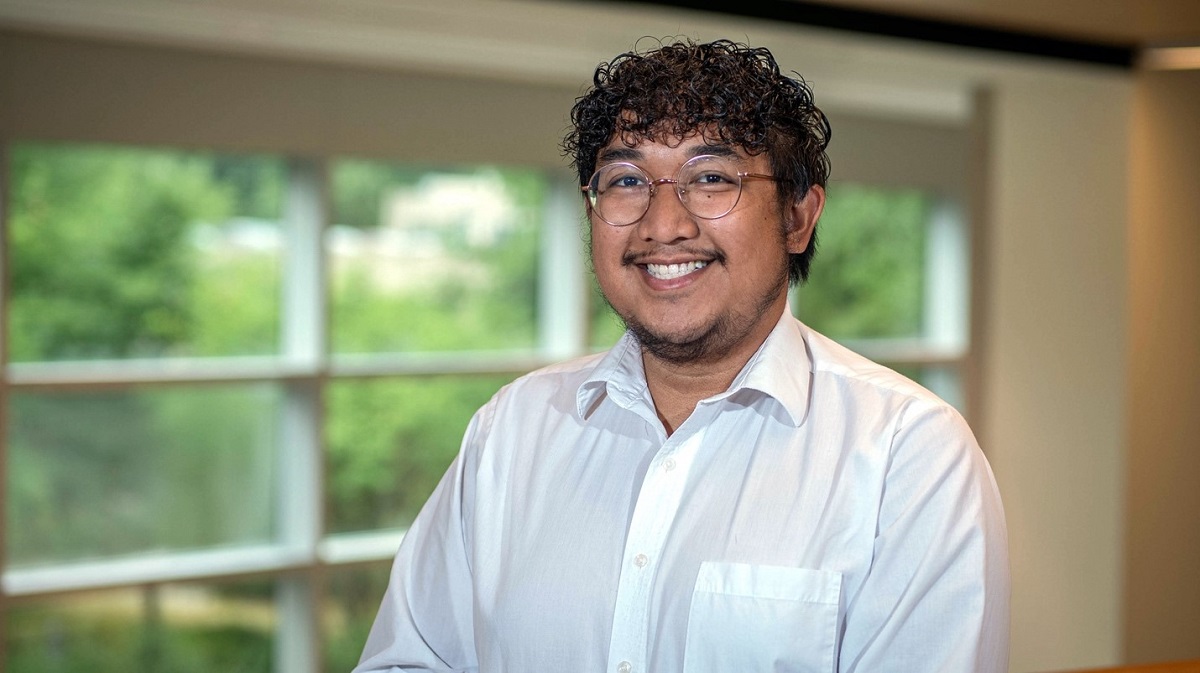
A making of a Doctor
15 July 2022
Hello! My name is Jhon Pasamonte and I am a rising senior at the University of Delaware (UD). For the past three years, I have struggled to choose among a degree in Chemistry, Biochemistry, Biology, and even at a point, an English degree. After almost finishing my junior year, I declared my major as both Chemistry and Biology, with a minor in Biochemistry. The constant struggle of choosing my major pretty much sums up my life. I have gone through loops of choices. What college do I want to go to? What do I want to study? Grad school or med school? That one, I am still trying to decide. I have done undergraduate research in chemistry at the UD and to sum up my experience … it wasn’t for me. I still love chemistry and how everything boils down to structural stability and favorability, but I knew something was missing.
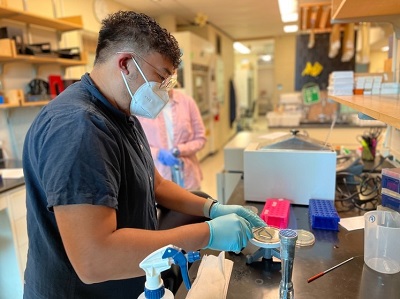 After that experience, I began branching out to opportunities in the Biology Department at UD. One of the first things I learned about was NUCLEUS, an organization that helps undergraduates in STEM find opportunities in research. Turns out, it was a place for people like me who needed some help. After joining, I received a newsletter with a link to the Fox Chase website linking to this fellowship. I read about the program, saw it was offered to UD students and immediately said, “I have to get this.” I went through the process of applying for a bus trip and eventually toured the campus. As soon as we started the introduction, imposter syndrome hit me like a truck. There were underclassmen who already had their entire life written. They knew they wanted to go to med school and knew they were going to be an XYZ doctor. I was sitting there, no clue if I wanted to go to med school let alone consider what type of doctor I want to be.
After that experience, I began branching out to opportunities in the Biology Department at UD. One of the first things I learned about was NUCLEUS, an organization that helps undergraduates in STEM find opportunities in research. Turns out, it was a place for people like me who needed some help. After joining, I received a newsletter with a link to the Fox Chase website linking to this fellowship. I read about the program, saw it was offered to UD students and immediately said, “I have to get this.” I went through the process of applying for a bus trip and eventually toured the campus. As soon as we started the introduction, imposter syndrome hit me like a truck. There were underclassmen who already had their entire life written. They knew they wanted to go to med school and knew they were going to be an XYZ doctor. I was sitting there, no clue if I wanted to go to med school let alone consider what type of doctor I want to be.
After receiving the email congratulating me on being accepted into this program, I was shocked and relieved that the wait was over. I was excited to meet the three strangers that I was going to be living with and excited to dive into a new field of research and to learn more about my interest and to get closer to answering the question, “what’s next?”
My first month at Fox Chase felt like my freshman year of college. I was filled with an array of emotions ranging from excitement to self-doubt. I was meeting doctors who were so passionate about their research and so passionate about my success, I felt confident and happy coming in everyday. In the first week we were exposed to everything. I did my first gel electrophoresis, I learned how to count cells effectively at the cell culture facility and learned how to use an inverted microscope. After our boot camp was over, I met my mentor, Dr. Mark Andrake. I have never felt more like a grad student. He encouraged me to ask questions, and never directly gave me an answer but instead pondered ideas with me until I eventually answered the question myself. In his lab I learned the life cycle of HIV-1 and how integrase (an enzyme) and reverse transcriptase (another enzyme) are essential in incorporating viral RNA (the bad genome), into the host DNA. With this introduction, I was able to come up with my own research question. I want to explore how integrase interacts with viral RNA, and by preventing this interaction we instead produce immature and eccentric viral particles that are not transmittable like the mature RNA.
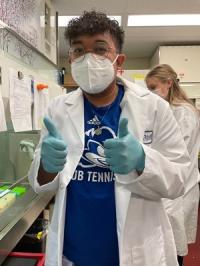 Because of my experience at Fox Chase, it has given me great insight on what it takes to be a grad student. I know answering this question is impossible to answer in the ten weeks I am here, but as I continue diving deep into this research question, I plan on exploring this question, and hopefully come back and answer this question myself before anyone else does.
Because of my experience at Fox Chase, it has given me great insight on what it takes to be a grad student. I know answering this question is impossible to answer in the ten weeks I am here, but as I continue diving deep into this research question, I plan on exploring this question, and hopefully come back and answer this question myself before anyone else does.
So far my first month here has been successful. I’ve learned so much more about myself and the fields I want to get into than I had in my three years of undergrad. The exposure this program brings to us is an experience I cannot get elsewhere. Soon I will be shadowing MD doctors and PhD doctors in the field of oncology that will hopefully help me answer the question “What type of doctor do I want to be?”
A decision made
16 August 2022
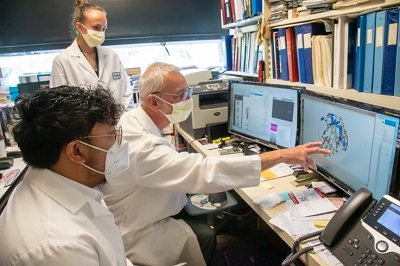 The second half of the fellowship was the most intense few weeks of my life. I shadowed Dr. Bleicher, a breast surgeon at Fox Chase Cancer Center. I learned what he does in a clinical setting and even watched a surgery. This experience would have never been possible without this fellowship. Leaving the operating room spurred more questions than answers to my question, “MD or Ph.D.?”. Around this time, my project started picking up. My PI, Dr. Andrake, and I came up with a question to answer for the next few weeks of my fellowship. We wanted to see if integrase, a viral enzyme, helps with viral-RNA packaging. So for the rest of my time I made a protein and used a Sodium Dodecyl Sulfate (SDS) gel to measure if we got the correct protein. Once we confirmed that we had the right molecule, it was time to work with our RNA.
The second half of the fellowship was the most intense few weeks of my life. I shadowed Dr. Bleicher, a breast surgeon at Fox Chase Cancer Center. I learned what he does in a clinical setting and even watched a surgery. This experience would have never been possible without this fellowship. Leaving the operating room spurred more questions than answers to my question, “MD or Ph.D.?”. Around this time, my project started picking up. My PI, Dr. Andrake, and I came up with a question to answer for the next few weeks of my fellowship. We wanted to see if integrase, a viral enzyme, helps with viral-RNA packaging. So for the rest of my time I made a protein and used a Sodium Dodecyl Sulfate (SDS) gel to measure if we got the correct protein. Once we confirmed that we had the right molecule, it was time to work with our RNA.
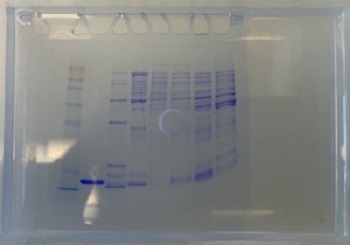 We soon found out the protein we made earlier had the wrong dye indicator, so we substituted it with an mEmerald protein. One of the other challenges we faced along the way was the machine we intended to use. Our first thought was to measure polarization levels to see if the integrase was binding to our RNA, but we discovered that our machine does not measure polarization because it does not have the right lenses. So back to the drawing board. My PI decided, instead of measuring polarization, we should measure fluorescence resonance energy transfer or FRET. This our machine can do. Basically, our protein will donate electrons to our RNA, and the machine measures this energy transfer by showing an increase in RNA signaling and a decrease in protein signaling. After a few experiments and obstacles, we showed FRET occurrence and showed a good understanding that integrase and RNA are binding to each other.
We soon found out the protein we made earlier had the wrong dye indicator, so we substituted it with an mEmerald protein. One of the other challenges we faced along the way was the machine we intended to use. Our first thought was to measure polarization levels to see if the integrase was binding to our RNA, but we discovered that our machine does not measure polarization because it does not have the right lenses. So back to the drawing board. My PI decided, instead of measuring polarization, we should measure fluorescence resonance energy transfer or FRET. This our machine can do. Basically, our protein will donate electrons to our RNA, and the machine measures this energy transfer by showing an increase in RNA signaling and a decrease in protein signaling. After a few experiments and obstacles, we showed FRET occurrence and showed a good understanding that integrase and RNA are binding to each other.
Just a week left in the lab, I was happy that I had good results to show at the final symposium. The remainder of my fellowship was spent on making my presentation flawless with PowerPoint transitions expressing how complicated but important this project is. But still, that question about what to do with my future haunted me. Having been in the operating room for a day and doing research for ten weeks wasn’t enough to answer my question. So I started talking to people. I had help from advisors at school, and the other fellows, as well as having a conversation with myself. To quote Dr. Rall, one of the most inspiring people I’ve met this summer, “In science, you will have many failures but the one success you achieve will make it all worth it.” Having done what I have to get my final results in the lab was worth it. I learned so much about myself and what I like and didn’t like. I learned that I really enjoy the nitty gritty of research and that I can bounce back if plan A fails. I also learned that as much as I love the idea of being a medical doctor and helping people every day, I can’t see myself talking to dozens of patients a day. Ultimately this made my decision. I decided to go to graduate school and continue on the research path instead of medical school. The next question is what I want to study. Well, that’s easier said than done.
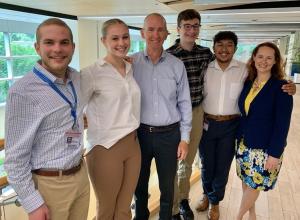 Finishing this program is bittersweet. I learned so much in the past ten weeks. I am excited to see what I will do next year. To anyone reading this who is currently going through the same struggle as I did, I hope the lesson you take away from this is to take advantage of every opportunity given to you. Even though this fellowship aimed to expose us to the life of research, I was still able to connect with people outside of the research world. Don’t be afraid to ask questions and to ask for help when you need it. You can’t answer everything on your own. This fellowship will show you that teamwork is an essential part of making a doctor.
Finishing this program is bittersweet. I learned so much in the past ten weeks. I am excited to see what I will do next year. To anyone reading this who is currently going through the same struggle as I did, I hope the lesson you take away from this is to take advantage of every opportunity given to you. Even though this fellowship aimed to expose us to the life of research, I was still able to connect with people outside of the research world. Don’t be afraid to ask questions and to ask for help when you need it. You can’t answer everything on your own. This fellowship will show you that teamwork is an essential part of making a doctor.